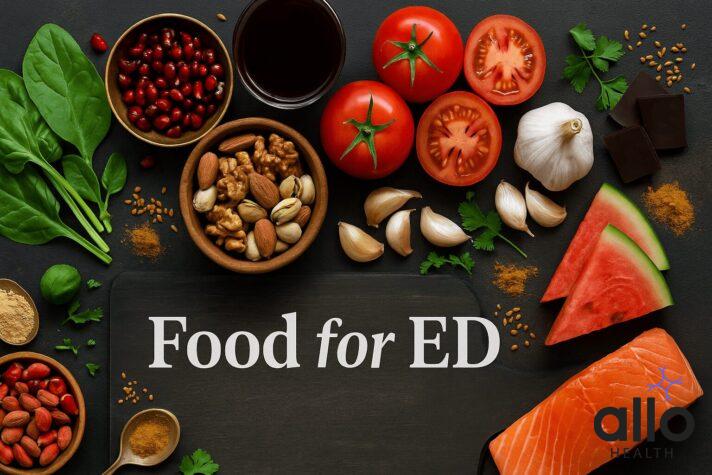Best Foods to Help Treat Erectile Dysfunction Naturally

If you're looking for safe, natural ways to manage erectile dysfunction, certain foods can make a real difference. This article covers science-backed options- like leafy greens, nuts, berries, fatty fish, and more which that support blood flow, hormone balance, and sexual function. While food isn’t a replacement for medication, it can be a powerful part of your overall strategy. Just remember to consult your doctor, especially if you're already on ED treatments, to ensure your diet and medication work well together.
Looking for the best foods for impotence? You’re in the right place. While food isn’t a replacement for medical treatment when it’s needed, the right diet can play a powerful supporting role. That’s because many cases of erectile dysfunction are tied to poor blood flow, inflammation, or hormone imbalance, all things that certain foods can help improve.
In this article, we’ll discover specific, science-backed foods for better erections, how they work in the body, and simple tips to add them to your daily routine. It’s a safe, natural way to take control of your health, starting with what’s on your plate.
How Food Affects Erectile Function

Erectile dysfunction can have many causes, but at its core, it’s often about poor blood flow to the penis. This can result from health conditions, lifestyle habits, or aging, but the good news is, your diet can make a difference. Many foods that support heart health also benefit sexual function and testosterone levels. They help by:
- Improving blood flow
- Reducing inflammation
- Boosting the production of nitric oxide (NO)- a key chemical that relaxes blood vessels so blood can flow easily
The best foods for better erection? Those rich in flavonoids[1], nitrates, and other natural compounds. These plant-based nutrients help keep blood vessels healthy, supporting both your heart, your erections, and your sexual health.
Top 10 Foods That May Help with Erectile Dysfunction

1. Leafy Greens and Nitrate-Rich Vegetables
These green powerhouses like spinach (palak), kale (karam saag), arugula (jarjeer), and methi leaves (fenugreek greens) are rich in nitrates. These nitrates get converted to nitric oxide in the body, which helps blood vessels relax and boosts blood flow to the penis.
Spinach is particularly beneficial as it’s rich in folate[2] (a nutrient whose deficiency has been linked to erectile dysfunction ) and magnesium, which stimulates blood flow. Beetroot[3] is another potent nitrate source that may help sustain the pressure necessary for maintaining erections.
How much: Aim for 1-2 cups of leafy greens daily. In Indian cooking, try adding palak to dal, making methi paratha, or including greens in your sabzi.
2. Tomatoes, Watermelon & Other Lycopene-Rich Foods
Foods rich in lycopene[4], like tomatoes, watermelon, and pink grapefruit, may naturally support better erections, especially in men with diabetes. Lycopene is a powerful antioxidant that helps lower blood sugar and boost nitric oxide levels, all of which improve blood flow and support vascular health.
Watermelon goes a step further. It contains L-citrulline[5], an amino acid your body converts into arginine, which also enhances nitric oxide production and relaxes blood vessels, improving circulation to the penis. On top of that, watermelon’s antioxidant properties may help improve sperm quality, testicular function, and reduce symptoms of male sexual dysfunction.
How much: 2-3 medium tomatoes daily or 1-2 cups of watermelon. Cooked tomatoes (like in curry) actually provide more bioavailable lycopene than raw ones.
3. Berries
Berries like blueberry, strawberry, amla (Indian gooseberry), jamun (black plum), and pomegranate (anar) not only give a flavourful smoothie mixture but they are actually heavily rich in flavonoids and antioxidants, improving blood flow and nitric oxide production and thus supporting a healthy erection.
How much: 1 medium amla daily, 1 cup fresh pomegranate seeds, or a handful of seasonal berries.
4. Nuts and Seeds
Nuts like walnuts (akhrot), pistachios[6] (pista), hazelnuts, and almonds (badam), besides being a healthy munchy snack, are also packed with nutrients. s like arginine, an amino acid that helps produce nitric oxide. A 14-week clinical[7] trial found that men consuming 60 g (about a handful) of mixed nuts daily reported improvement in sexual desire and sexual health.
How much: at least 30-40g daily (about 6-8 walnuts, 15-20 almonds, or 25-30 pistachios).
5. Dark Chocolate
Dark chocolate (70% cacao or higher) contains flavonoids, which can help improve blood flow and nitric oxide production. The antioxidants and moderate caffeine, along with phenylethamine present in the dark chocolates, can help enhance mood and stimulate sexual desire.
How much: 20-30g daily (about 2 small squares). Choose brands with minimal added sugar.
6. Fatty Fish
Salmon(rawas), mackerel (bangdra), and other fatty fish are rich in omega-3 fatty acids[8]. These support heart health and better blood flow. Research has found that omega-3 fatty acids can improve erectile dysfunction and help maintain hormonal balance by supporting testosterone production and maintaining testosterone levels. Along with all these benefits, these fats also have anti-inflammatory properties.
How much: 2-3 servings per week (150-200g per serving).
Regional alternatives: If coastal fish are expensive, consider river fish like rohu or catla, which also contain beneficial omega-3s, though in smaller amounts.
7. Shellfish and Oysters
Oysters and other shellfish are rich in zinc, a mineral crucial for testosterone production and sperm health. Zinc[9] deficiency can lower testosterone levels and contribute to erectile dysfunction. Shellfish also contain omega-3 fatty acids that help with blood flow by reducing inflammation and supporting blood vessel function.
Indian alternatives: If shellfish aren’t available or preferred, pumpkin seeds (kaddu ke beej), sesame seeds (til), and chickpeas (chana) are excellent zinc sources.
How much: 2-3 servings of shellfish weekly, or 2 tablespoons of pumpkin seeds daily.
8. Garlic
Garlic contains allicin, the yellow liquid that comes out when you crush/cut a garlic. Allicin[10] helps in relaxing the blood vessels by supporting nitric oxide production. It also helps with circulation and supports heart health.
How much: 2-3 cloves daily, either raw or cooked.
9. Eggs
Eggs, especially the yolks, are packed with nutrients that may support better erections. They contain L-arginine, which helps improve blood flow, and Vitamin D, which supports nitric oxide production. Plus, vitamin B in eggs help maintain healthy hormone levels, all key for sexual function.
How much: 4-6 whole eggs per week (Contrary to old beliefs, dietary cholesterol doesn’t significantly impact blood cholesterol for most people).
10. Coffee
Surprised that coffee might help with erectile dysfunction? Study[11] shows that 2–3 cups a day (170–375 mg of caffeine) may lower the risk of erectile dysfunction. Caffeine may support the production of nitric oxide, helping blood vessels relax and boosting blood flow to the penis. Plus, coffee is rich in antioxidants, which support overall vascular and sexual health.
Foods to Limit or Avoid
Just like some foods can boost your sexual health and help improve erectile dysfunction, others can work against it. Certain dietary habits can increase inflammation, reduce blood flow, impact testosterone levels, and worsen conditions that contribute to erectile dysfunction. Here are some foods and habits to watch out for:
- Fried and processed foods are high in saturated and trans fats
- Red meat and full-fat dairy, which may affect heart and blood vessel health
- Refined carbs like white bread, pastries, and sugary snacks
- Foods high in sodium and added sugars
- Excessive alcohol can interfere with blood vessel function
Important Safety Considerations
Drug Interactions:
If you’re taking ED medications like sildenafil (Viagra) or tadalafil (Cialis), be cautious with:
- Grapefruit may raise drug levels in the body
- Garlic supplements can increase blood-thinning effects
- High amounts of beetroot juice may overly lower blood pressure if you’re on BP medication.
Blood Pressure Medications:
Nitrate-rich foods (like leafy greens or beetroot) can amplify the effects of blood pressure meds. Monitor your levels and consult your doctor before major diet changes.
Diabetes Management:
These foods can support ED, but blood sugar control remains key. Track how new foods affect your glucose and adjust as needed with your doctor’s guidance.
Think of food as part of your treatment plan. It won’t replace medication if you need it, but it can support your body’s ability to perform naturally and safely.
When To See a Doctor
While dietary changes can significantly help with erectile dysfunction, they’re not a magic fix. A balanced approach combining these beneficial foods with regular exercise, stress management, and maintaining a healthy weight offers the best natural strategy for supporting erectile function. It’s important to consult a doctor if:
- ED symptoms persist after 3-4 months of dietary changes
- You have underlying conditions like diabetes or heart disease
- You’re taking medications that might interact with dietary changes
- You experience a sudden onset of ED (which could indicate serious health issues)
Wrap Up: Your ED-Friendly Grocery List

Next time you’re at the grocery store, stock up on foods that support better erections and a healthier heart. Think: leafy greens, whole grains, fatty fish, nuts, seeds, berries, and antioxidant-rich fruits like pomegranate.
While these foods can absolutely support your sexual health, remember, there’s no such thing as a magic “natural Viagra.” If there’s an underlying issue, diet alone may not be enough. That’s why it’s always smart to keep your doctor in the loop. They can guide you on whether you need additional support, like medications, or if any of these foods might interact with ED treatments.
At the end of the day, a healthy diet and lifestyle are powerful tools to help your body recover, perform better, and reduce the risk of erectile dysfunction.
"The following blog article provides general information and insights on various topics. However, it is important to note that the information presented is not intended as professional advice in any specific field or area. The content of this blog is for general educational and informational purposes only.
Book consultation
The content should not be interpreted as endorsement, recommendation, or guarantee of any product, service, or information mentioned. Readers are solely responsible for the decisions and actions they take based on the information provided in this blog. It is essential to exercise individual judgment, critical thinking, and personal responsibility when applying or implementing any information or suggestions discussed in the blog."






